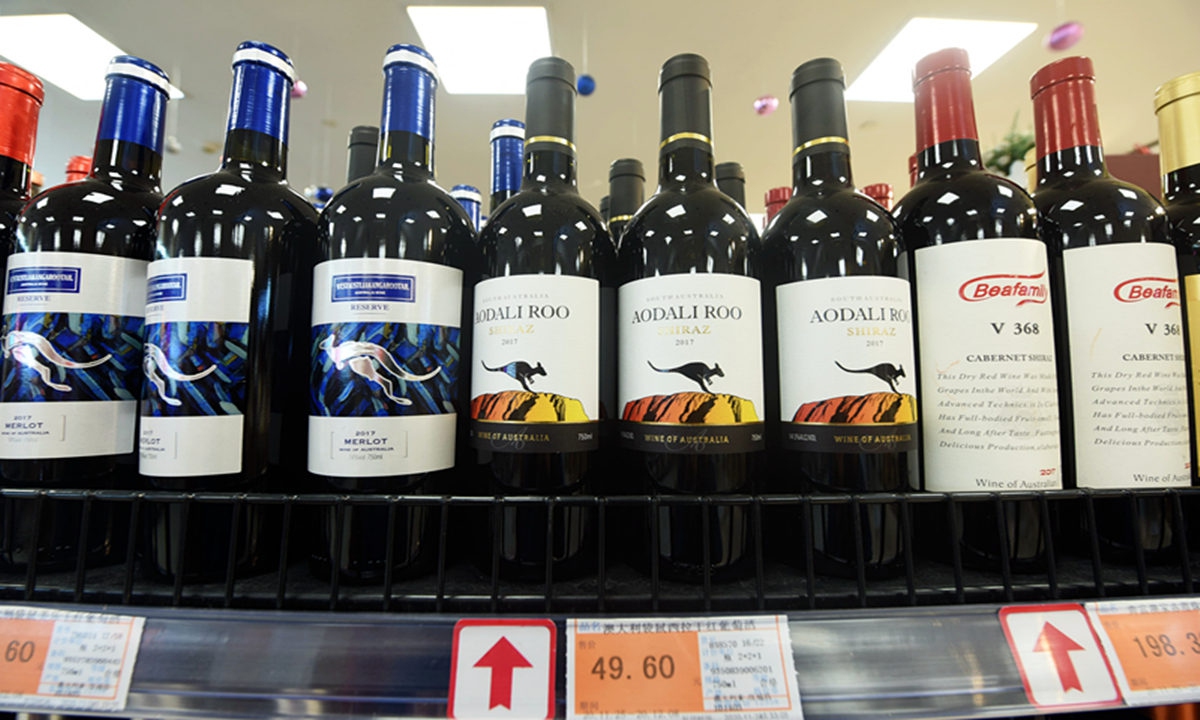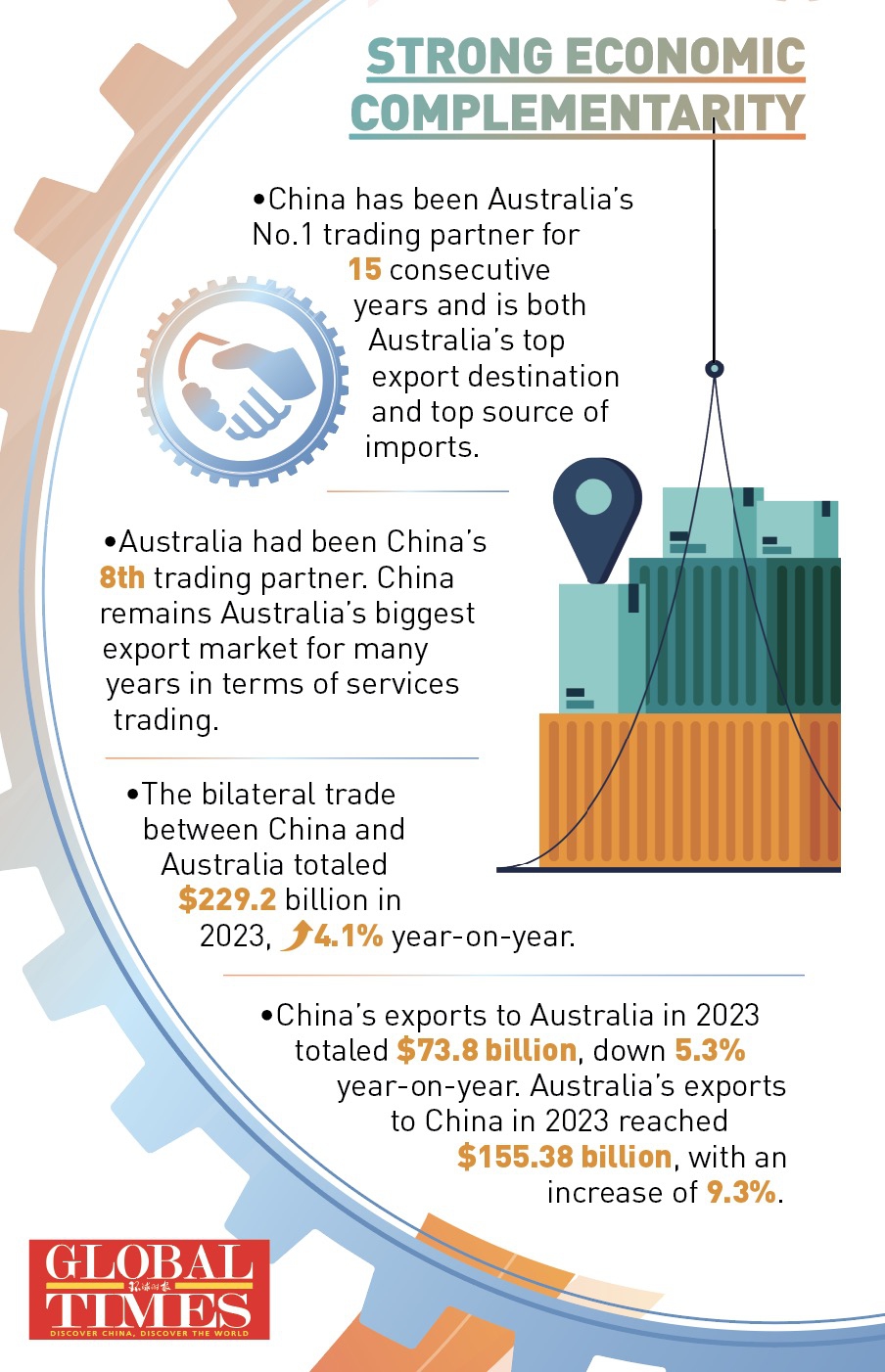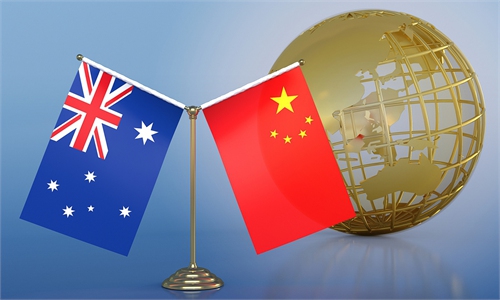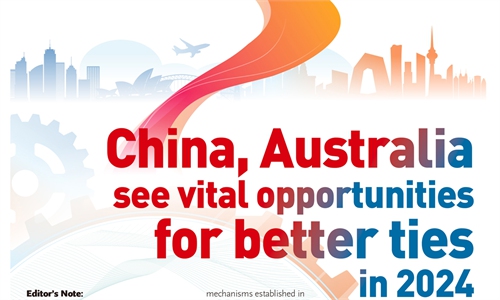China, Australia can further tap economic complementarity while addressing existing trade disputes: analysts
Cooperation in new and emerging sectors should be expedited: analysts

Bottles of Australian wine on the shelf of a supermarket in Hangzhou, East China's Zhejiang Province on November 27, 2020 Photo: VCG
China and Australia can further tap their economic complementarity while addressing existing trade disputes, Chinese analysts said on Wednesday, as the visit to Australia by Chinese Foreign Minister Wang Yi signified that bilateral relations are on the right track.
China is willing to work with Australia in fostering more common interests and building a fair, transparent business environment for enterprises from both countries, in a bid to accelerate the bilateral relationship, said Wang, who is also a member of the Political Bureau of the Communist Party of China Central Committee, during the seventh China-Australia Foreign and Strategic Dialogue with Australian Foreign Minister Penny Wong.
China is willing to expand cooperation with Australia in trade, new energy, digitalization, green economy and more, the Chinese Foreign Minister said, noting that the two sides should constantly strive to make the pie of common interests bigger.
Chinese experts said that the Wang's visit has shown a new direction for economic cooperation between the two countries, which enjoy tremendous complementarity in both traditional sectors and emerging ones.
The Albanese administration should take aim at new areas of cooperation with China, such as in the new-energy sector, while at the same time addressing its trade disputes with China, Chinese analysts noted.
Wang Shiming, a professor at the School of Politics and International Relations of East China Normal University, told the Global Times on Wednesday that the visit by the Chinese Foreign Minister is a confirmation that China and Australia stand to oppose trade protectionism, advocate trade liberalization and investment facilitation.
The visit also showed that China believes a steady and peaceful development of mutual relations is important to the Asia-Pacific region, he added.
China and Australia are expected to enhance cooperation in areas such as environmental protection, renewable energy and climate change, the expert mentioned, noting that the two sides could broaden the scope of economic and trade cooperation and offer better access for two-way investment.
"Facing economic pressure, Australia highly values its trade and economic relationship with China - it does not want to make unwanted problems that prevent the stabilization of its economic relationship with China," Zhou Fangyin, a professor at the Guangdong Research Institute for International Strategies, told the Global Times on Wednesday. "The consensus is that both sides hope for a stable economic relationship."
Zhou noted that there is no need to set too high a target for the stabilizing and recovering bilateral ties. "So long as the two sides hold basically similar views on economic matters of common concern, bilateral trade and economic cooperation will stand a good chance to gain traction and prosper, boosted by the inherent nature of the two economies' strong complementarity."
"Australia's resource exports to China have a natural advantage in quality and convenient transportation and China's vast market is very stable. So as long as the Australian side does not choose to irritate Chinese consumers, Australian companies are unlikely to suffer from unexpected challenges in the Chinese market," Zhou said.
Australian companies have expressed a welcoming attitude to the Wang's visit, noting that dialogue fosters understanding and the two countries have new opportunities in emerging sectors.
"We see the energy transition as a significant opportunity to cooperate with China. Already, we are exploring a range of options to reduce emissions in the steel value chain," Dino Otranto, CEO of Australian mining giant Fortescue Metals, told the Global Times over the weekend.

Strong economic complementarity
Last year, the company announced plans along with Chinese steelmaker China Baowu to work together on reducing emissions in the process of iron and steel production.
Many in Australia have seen trade with China as a fundamental pillar supporting Australian prosperity for the past 50 years.
In 2023, nearly 80 percent of Australia's foreign trade surplus came from trade with China, despite global uncertainties.
A pragmatic, non-political way of approaching trade disputes has helped the two countries iron out their trade disputes. Last week, Australia announced that it is suspending anti-dumping tariffs on Chinese wind tower imports.
Some Australian wine companies noted that a tariff on Australian wine exports to China could be canceled soon. A spokesperson of the Chinese Ministry of Commerce said last week that China will make a final review and ruling in accordance with the investigation procedures.
The two sides may also conduct dialogue in the area of tourism since Australia reportedly hopes for China to be its top tourism source again, according to Chinese analysts.
Since taking office in 2022, the Albanese administration has remedied its predecessor's irrational anti-China policies, prompting a positive response from the Chinese side. Hence, bilateral ties have gradually bottomed out, recovered and stabilized.



